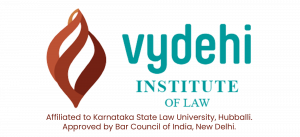Understanding Fundamental Rights: The Bedrock of Liberty
Introduction:

In any democratic society, the concept of “Fundamental Rights” stands as a cornerstone, representing the essential liberties and protections granted to every citizen. These rights are not mere privileges; they are inherent, inalienable, and often enshrined in the Constitution, serving as a powerful check on governmental power and ensuring the dignity and well-being of individuals.
⚖️What Are Fundamental Rights?
At its core, a Fundamental Right is a basic right considered essential for human existence and development. These rights are legally enforceable, meaning citizens can seek judicial remedy if they believe their rights have been violated. They act as a bulwark against oppression and arbitrary actions by the state, guaranteeing a minimum standard of living and freedom.
📘Types of Fundamental Rights in India.
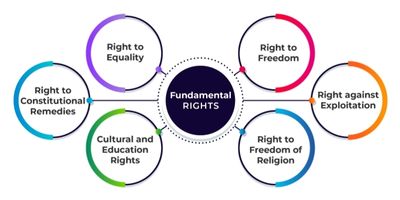
1️⃣ Right to Equality (Articles 14–18)
- Guarantees equality before the law and equal protection of laws.
- Prohibits discrimination on the basis of religion, race, caste, sex, or place of birth.
- Abolishes untouchability and titles.
🟢 Example: Reservation in education and employment promotes equal opportunity.

2️⃣ Right to Freedom (Articles 19–22)
- Includes freedom of speech and expression, assembly, association, movement, residence, and profession.
- Provides protection against arbitrary arrest and detention.
🟢 Example: Citizens can express opinions freely on social issues within the limits of law.
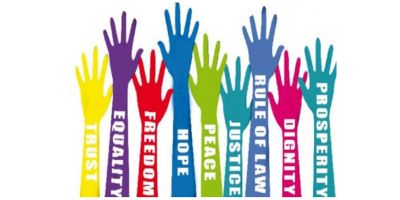
3️⃣ Right against Exploitation (Articles 23–24)
- Prohibits human trafficking, forced labor, and child labor in hazardous industries.
🟢 Example: Employing children below 14 years in factories or mines is illegal.

4️⃣ Right to Freedom of Religion (Articles 25–28)
- Guarantees freedom of conscience and the right to profess, practice, and propagate any religion.
🟢 Example: Every citizen can celebrate and follow their faith without interference.
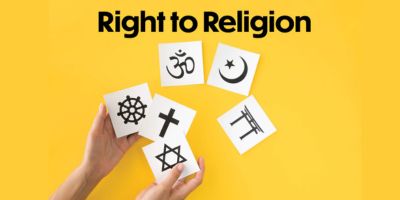
5️⃣ Cultural and Educational Rights (Articles 29–30)
- Protects the cultural, linguistic, and educational rights of minorities.
🟢 Example: Minority institutions can establish and manage their own educational institutions.
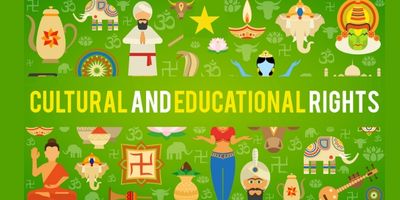
6️⃣ Right to Constitutional Remedies (Article 32)
Dr. B. R. Ambedkar called this the “heart and soul of the Constitution.
Allows citizens to approach the Supreme Court or High Courts for enforcement of their Fundamental Rights.
🟢 Example: Filing a writ petition if a right is violated (Habeas Corpus, Mandamus, etc.).
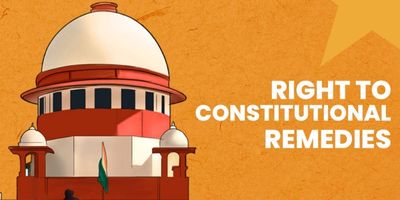
🌟 Importance of Fundamental Rights.
- Protect citizens from discrimination and injustice.
- Promote liberty, equality, and dignity for all.
- Ensure social, economic, and political justice.
- Strengthen democracy by holding the government accountable.
- Encourage responsible citizenship and respect for others’ rights.
- Enable courts to strike down unconstitutional laws.
🧩 Uses of Fundamental Rights.
- Safeguard freedom of speech and expression in a democracy.
- Prevent exploitation and oppression by powerful groups.
- Promote equality and social inclusion.
- Encourage educational, cultural, and intellectual growth.
- Provide effective legal remedies for violations.
- Empower citizens to participate actively in governance and policy discussions.
⚖️ Landmark Supreme Court Cases Related to Fundamental Rights.
- Kesavananda Bharati vs. State of Kerala (1973): Established the Basic Structure Doctrine of the Constitution.
- Maneka Gandhi vs. Union of India (1978): Expanded the interpretation of personal liberty under Article 21.
- Indira Sawhney vs. Union of India (1992): Clarified reservation policies under the Right to Equality.
- Shreya Singhal vs. Union of India (2015): Upheld freedom of expression by striking down Section 66A of the IT Act.
⚖️ The Essence of Fundamental Rights.
The true essence of Fundamental Rights lies in their ability to balance individual liberty and state authority, encompassing several key aspects
- Limitation on State Power: These rights restrict the government from infringing on individual freedoms, creating a protected sphere of personal autonomy.
- Protection of Liberty and Dignity: They safeguard individuals’ dignity, allowing them to express themselves freely and live without fear of arbitrary interference.
- Promotion of Equality and Justice: By guaranteeing equal treatment under the law, these rights aim to build a fair and inclusive society.
- Foundation of Democracy: Fundamental Rights empower citizens to participate in governance, voice dissent, and hold authorities accountable.
- Ensuring the Rule of Law: They uphold the principle that everyone — including the government — is bound by law.
- Fostering Human Development: By securing basic freedoms, they create an environment for education, economic progress, and personal growth.
- A society where Fundamental Rights are fully respected is one that thrives on justice, equality, and freedom. Such a society encourages vibrant public discourse, diversity of thought, and a government that is responsive and accountable to its citizens.
- 🕊️ The image of a balanced scale perfectly symbolizes the delicate equilibrium these rights maintain between individual liberty and state power.
Conclusion:
Fundamental Rights in India are essential for the protection of individual liberties and the promotion of equality, justice, and democracy. Understanding these rights empowers citizens to actively participate in the nation’s development while safeguarding their freedoms.
fundamental rights in india, types of fundamental rights, fundamental rights definition, fundamental rights how many, importance of fundamental rights, rights of citizens in india, indian constitution rights, fundamental rights and duties, fundamental rights articles, 6 fundamental rights of india, fundamental rights upsc, women rights in indian constitution, article for women’s rights in indian constitution, human rights in indian constitution, 19 article of indian constitution, 1st amendment of indian constitution upsc, article 12 indian constitution, 21 article of indian constitution, 6 fundamental rights of indian constitution, 6 fundamental rights with articles, 6 rights of indian constitution, 7 fundamental rights of india, 7 human rights in india, about fundamental rights and duties, about fundamental rights of india, all articles of fundamental rights, all fundamental rights and duties
